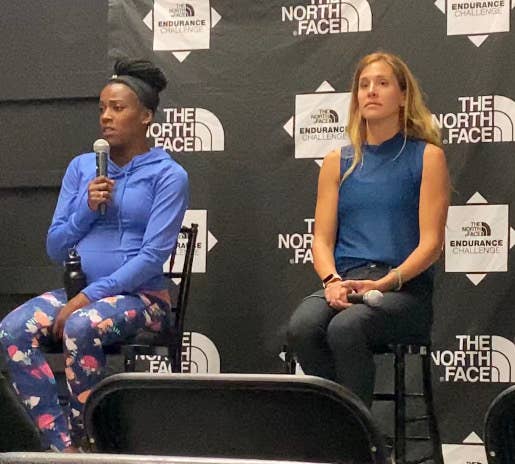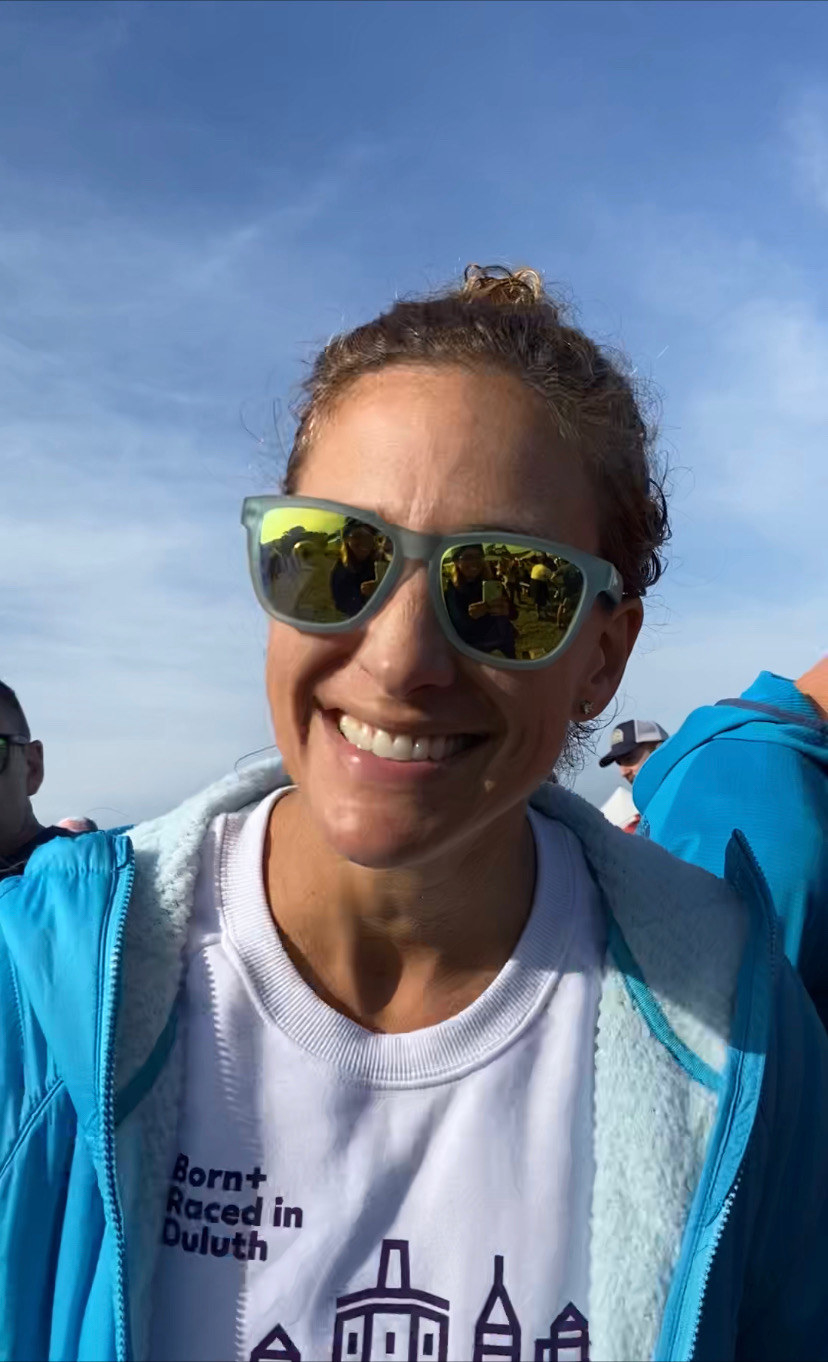
Olympic runners Alysia Montaño and Kara Goucher said they are fed up, describing how they have gone through "hell and back" in a sport that they love to their core, but has caused them so much pain, anger, and heartache.
The Olympians spoke out at a chilly sports store in San Francisco, as part of a panel on transparency in running hosted by the North Face Endurance Challenge and Clean Sport Collective.
The athletes bluntly criticized the big-name brands and high-powered US athletic agencies who have been accused of covering up and enabling alleged abuse and mistreatment of young, star runners, as well as widespread doping.
"There is a huge cultural and systematic issue that we face in the sport...a win at all costs mentality, which is not the right mentality," Montaño, an elite middle-distance runner and seven-time USA champion, told moderator Chris McClung. "Ultimately, it damages people’s lives, it damages people’s health. It takes away from the pureness and incredible optimism that you should be able to have as you pursue your goals and dreams..."
The 33-year-old has been an outspoken critic about her experience as a pregnant athlete, calling out her own former sponsor, Nike, as well as top US sports bodies like the United States Olympic Committee and World Federation (IAAF). The runner, who has won two World Championship bronze medals, famously raced while 8 months pregnant, wearing a pink singlet and a yellow flower in her hair.
In May, she wrote a searing opinion piece for the New York Times. Her piece has helped propel a pivotal, painful public callout and watershed moment in the elite running and track and field worlds.
Since then, Montaño, Goucher, and a host of other powerful women runners have continued to lambast big brands and governing sports bodies for how they allegedly treat their women athletes, accusing them of protecting coaches who abuse, body-shame, and sacrifice their athletes' health to win.
"What are your values? Do you have ethics? Do you have integrity?" Montaño asked, addressing Nike and the World Federation. "It's not just women in sport, but they are a huge target for things like weight, emotional abuse... I think this is the time where, at least for me, we have said enough. We are tired of not being able to pursue happiness in the way that we deserve to."
Now pregnant with her third child, Montaño has become an advocate for women athletes. She said the organizations are not doing enough to eradicate abusive coaches or fix systemic issues, like doping.
"The [IAAF], they knew, they covered up the doping and that is unforgivable to me and I still don't think they are paying enough for it," she said. "I am still in conflict with how I feel. I feel a lot of feelings and I think I am trying to hide the ones that are going to make me go sobbing on the floor."
The runner was referencing doping scandals that plagued the organization and led to her being cheated out of two bronze medals in 2011 and 2013 after she finished fourth behind a Russian athlete who, in 2017, was officially disqualified for doping. Six and eight years later, Montaño finally received her medals.
In a follow-up email, Montaño also said that USA Track and Field also has its "own set of issues, like not helping us heal the doping/ win at all costs mentality by continually putting doping violators as the face of USATF."
In response to her complaints, World Athletics said in a statement to BuzzFeed News that the current administration has "cooperated fully with the French investigation" and await the outcome of the probe.
“Since this issue was revealed in 2015, World Athletics President Sebastian Coe and the Council have introduced wide ranging governance reforms right across the sport to ensure its future integrity, including the creation of the Athletics Integrity Unity, an independent body responsible for managing integrity issues across the sport, including doping," a spokesperson said in an email to BuzzFeed News.
Those who have been accused of corruption in the previous IAAF administration will go on trial in France in January.
Major athletic bodies and brands have come under even more scrutiny since the New York Times published an op-ed video earlier this month. In it, renowned high school running star Mary Cain detailed her alleged emotional and physical abuse as a teen athlete at Nike's recently shuttered professional training organization, the Oregon Project. Cain claimed that the toxic culture drove her into disordered eating, suicidal thoughts, and self-harm.
Her allegations came after US doping officials found the project's director and one of the country's most famous Olympic coaches, Alberto Salazar, guilty of illegally enhancing his athletes' performance and banned him from the sport for four years.
After placing 6th in the 10,000m at the 2011 USATF championships, I was kicked out of the Oregon Project. I was told I was too fat and “had the biggest butt on the starting line.” This brings those painful memories back. https://t.co/ocIqnHDL8F
Goucher, who used to run for Salazar, was one of the first athletes to blow the whistle on the director, telling federal officials in 2011 and 2012 that Salazar was doping his runners.
Salazar has vehemently denied all the allegations against him, telling outlets like Sports Illustrated that while some of his comments were "callous or insensitive," he never abused or discriminated against athletes. Nike says it's investigating.
At the North Face event this past weekend, Goucher said she was "pumped" that her former coach got the "largest ban you can get for a first-time offense," but noted that more people need to be held accountable.
"When the head of the biggest team in the world falls, that's a good thing," she told the crowd. "It shows that people care and have invested the time and resources to prove this person crossed the line, and it sends a very strong message that this is not to be tolerated."
“It feels like a bit of a #MeToo movement,” Goucher says. “I’m very hopeful because people are believing us. There’s a genuine desire for change and that will be amazing.” https://t.co/UnAZKvhyFL
The Olympic medalist and decorated marathoner has become a lead voice in the reckoning that has taken over the running world, supporting and lauding other athletes like Cain who are slamming Salazar and others for mistreatment.
"At first it was very difficult. It cost me sponsor opportunities, kept me out of races," Goucher told BuzzFeed News. "But now that there are more voices on the front line we are being believed. The media is sharing our stories. The tide is turning and it makes all the sacrifices worth it."
Goucher said the work, while immensely gratifying, has been draining and emotionally exhausting.
"I am not going to lie, I am really drained," Goucher said after the panel, the night before she was set to run a 50-kilometer ultramarathon through the steep, foggy, hills of Marin County.

But, she said, she's "hopeful for the sport."
"I have been through literally hell and back and I am still here, so there's a reason to be hopeful," she told the audience at the Clean Sport Collective talk.
The next morning, sporting a new medal and stiff-legged limp, Goucher smiled while talking about coming in third woman in her first 31-mile ultra race.
"I hope road running can return to this," she nods at the damp grass, covered with exhausted, muddy, beer-drinking trail runners. "We're so focused on Olympic qualifiers and world records, and I get it — that's the world I lived in for a really long time — but it takes away from the purity and excitement...of what it means to get out there and run hard."
The experience and ultra-running's "chill," "welcoming" atmosphere is one of the reasons the Olympian said she still believes that competitive road running and track and field can fix its image and heal its culture.
"This is what running was, to me, when I first started," she said, adding that, one of the best parts is seeing "women in their forties and fifties just kicking ass."
CORRECTION:
Montaño was discussing her experience with the IAAF. A previous version of this article misquoted from Montano to refer to US Track and Field.
